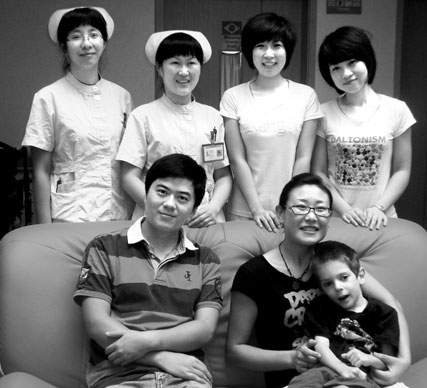Are you or a loved one interested in receiving stem cell treatment? For free information, please fill out our
treatment form or email me don@repairstemcells.org and just put TREATMENT in the subject box and the MEDICAL CONDITION in the message.

Charlie DeJong and some of the devoted nursing staff at the clinic in China
IROQUOIS — Their deep belief that the future can indeed be brighter for six-year-old Charlie, took the family of Matthew and Kelly DeJong thousands of kilometres around the globe to China, in the early fall of 2011.
“Charlie has cerebral palsy,” said mother, Kelly DeJong. “However, his long term prognosis at age six was very poor.”
Charlie had no independent functions. He was unable to chew and swallow solid food, which meant that he would probably have to be attached to a feeding tube in the near future. Spastic muscles refused him the ability to sit up independently, walk or speak. He was unable to regulate his circulatory system, suffering extremes of cold and heat. He could not control his eyes well enough to focus on many things.
“Yet Charlie is a healthy, happy little guy,” his mother said. “We wanted to give him better opportunities. We hoped for any improvement in his quality of life.”
Through the year-long efforts of neighbours, family, businesses, service groups (including the Iroquois-Matilda Lions Club) churches and the simple generosity of caring strangers, the family was able to raise the $50,000 needed to pay for the out-of-country treatments.
On July 14, Charlie and his mother, along with cousin Hanke DeJong Thompson, left Ottawa on the first leg of a journey that would take them to Vancouver, then to Hong Kong and finally to Qingdao, mainland China. Father Matthew and siblings Abigail and Thomas joined Charlie and Kelly in China for the final two weeks of the six weeks of treatments.
During those challenging weeks, the doctors kept Charlie on a series of treatments that would have been tough on an adult, let alone a small boy.
He received his first two stem cell treatments through IVs, but the next six were delivered through spinal injections, two a week, under general anaesthesia. This was ultimately very hard on him: a decision was made to give his last two injections intravenously.
He faced intensive deep tissue massage, acupuncture treatments and electric wave therapy every day.
A foot ball player from Canada, also undergoing spinal cell treatments, actually refused any further spinal injections after the first. “Later he told us that Charlie was the bravest kid in the hospital,” Kelly said.
On her second day in China, Kelly slipped on the “beautiful but lethal” granite walkways around the hospital and broke her foot.
To Charlie’s “mortification, I ended up on the same table as him, getting therapy on my foot as he was receiving it on his arms and legs,” Kelly recalled, laughing.
The DeJongs learned there are some profound differences between Eastern and Western methods of treatment.
“In China, symptoms are treated in a very business like manner. Chinese doctors are very passionate about their jobs, but they have little patience with unco-operative or semi traumatized patients. Children are treated like mini adults and expected to behave as such,” Kelly explained. “There are none of the emotional connections, the compassion between doctor and patient expected in Western medicine. When I broke my foot, essentially I was told to walk it off, to not make a fuss.”
“Yet,” said Matthew DeJong, “the people we met in China would have done anything for us. Patients stay on special floors at the Chengyang People’s Hospital, and translators are with families day and night. These people were always ready to interpret medical information (doctors seldom speak English) to deal with all our concerns and issues. Everyone, even street vendors, offered their help. This is a beautiful country. I think we all left part of our hearts in China.”
Has the family seen changes in Charlie since his return from China?
“Absolutely,” said Kelly. “He is now able to regulate his own body temperature. His muscle control is greatly improved; he is moving his body more easily and he seems to have developed much more stamina. This is incredible in a child who is spastic. He is struggling harder than ever to control the muscles in his mouth. I think he really wants to speak.”
“Charlie could never focus well on anything,” Matthew said. “Since he came home he has been able to focus on television and computer screens, following the action and dialogue and roaring with laughter at the comedies. His ability to pay attention has really improved.”
For Charlie one change that is highly significant is his new ability to chew.
It first appeared after his fourth stem cell injection.
For his entire life Charlie has only been able to eat puréed baby foods. His spastic bite reflex would not allow him to control chewing muscles. If he did attempt solid food of any kind, he threw up or choked.
“I was eating a grilled cheese sandwich one day,” Kelly said. “and he indicated he wanted some. He actually chewed and swallowed some tiny pieces. This was a phenomenal change. I have since been able to introduce lasagna, eggs, hamburgers, things he could never have touched. He chews slowly, but he chews. He has reduced the future need for a feeding tube by 80 per cent with this change.”
The long treatments in China ended on September 8 with a joyous family re-union in Ottawa with grandparents Albert and Reina DeJong and Heather and Dick Hamill.
“The doctors and staff in China often heard me telling Charlie to ‘keep your head up,’” said Kelly DeJong. “They began calling him ‘Taito’, which in Chinese means Head Up.”
Charlie DeJong is a determined young man, one definitely facing a challenging future with his ‘head up.’
DON MARGOLIS WILL MAKE IT EASY FOR YOU TO SEE IF YOUR CHILD CAN BE TREATED IN CHINA.